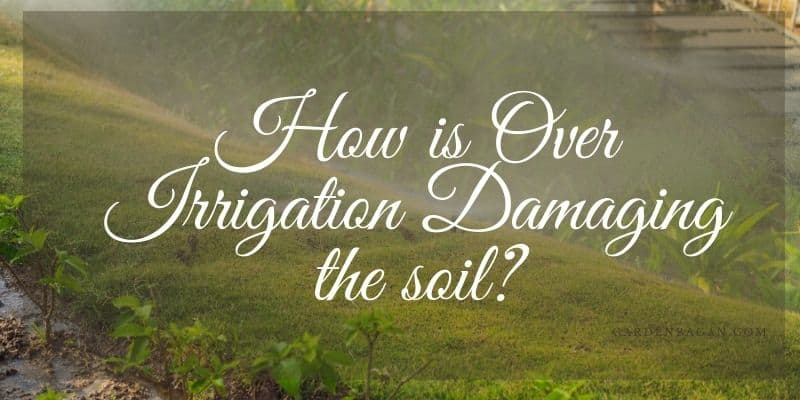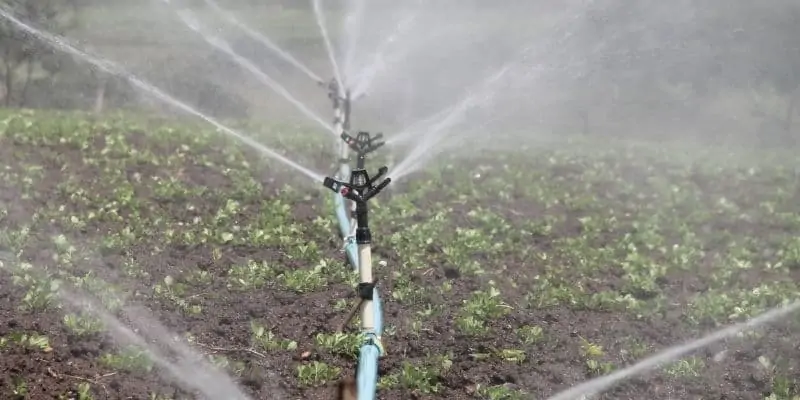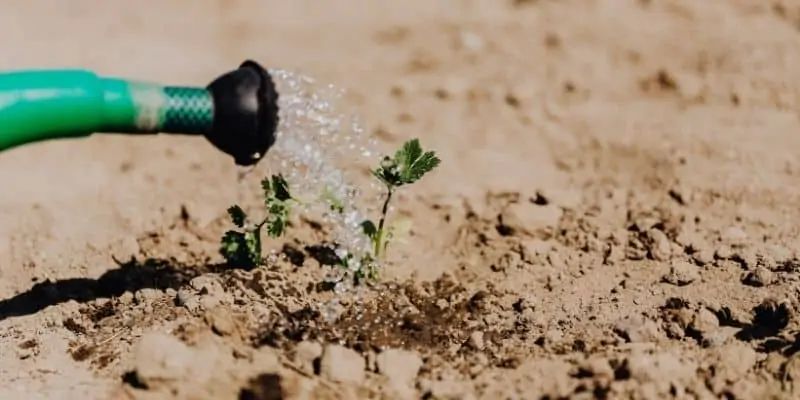Excess of anything is dangerous similarly too much watering is also harmful to your plants. Water is an essential part of gardening. You can avoid soil but water is required for sure. The need for water is inevitable for any plant but there is a limit for everything. Feeding a plant with too much water is certainly not good. We all have heard the term Over Watering or Over-Irrigation in the context of farming or gardening. Today we will discuss these in detail. Also, we will learn how is over-irrigation damaging the soil?

Check out my previous post-How to prepare your garden for cold Winter?
What is Over Irrigation?
If you are a Gardener or farmer then you already know what Irrigation is? – In simple words, Irrigation is a simple organized way of watering plants to keep them healthy and get commercial gains. This is simple, isn’t it?
Simple watering in the context of farmland is considered irrigation. If you are a home gardener, then this applies to you as well. If your plants are feeding you somehow then watering them regularly can be considered irrigation though on a very small scale.
Now the term Over Irrigation is self-explanatory. Too much watering or any kind of Irrigation to land more than it actually requires can be called over-irrigation. Even pouring water every day in your container without letting the soil dry is also over-irrigation.
Buy the latest Hydroponic Growing System on Amazon
Is Over Irrigation Harmful?
Yes, definitely over-irrigation is harmful not only for the plants but also for the soil that supports them. Water is the carrier of nutrients. Too much water can do adverse, i.e., it can wash the essential nutrients away from the plant.
The harmful impact of over-irrigation or overwatering can be observed during rainy days. Yellow leaves, dying seedlings, & drooping plants are a common sight after week-long precipitation. I know most of you will agree with my thought, if not then give it an experimental try. Hands-on experience is always useful than someone’s thought.
Check out- 13 Tips for Gardening in Rainy Season: Monsoon Gardening
How is Over Irrigation Damaging the Soil?
Soil is the first thing to come in contact with water while irrigation. Water dissolves the minerals, salts, and all other nutrients from the soil. If watering is done carefully then these dissolved nutrients are enough to feed your plants for long. But overwatering or over-irrigation do the opposite. It takes away these nutrients and also damages the soil integrity.
Over-irrigation can harm the soil in the following ways-
- Cause Waterlogging
- Disturb Nutrient Levels
- Damage Soil Integrity and Ph concentration
Let’s see how this happens.
Over Watering Erodes the topsoil
Overwatering or over-irrigation is directly responsible for soil erosion, especially in cultivable farmlands. This is a very slow process and cannot be easily observed. Over irrigation for years after years has changed the geographic scenarios in many countries.
Continuous flowing water takes away small portions of soil with it. After years of this cycle, the effect can be easily observed.
On a small scale, when we water our plants especially the container ones then a similar thing happens. Significant loss of soil can be seen after one or two seasons. This is inevitable but can be controlled with active measures. Also, the soil is not that cheap especially if you have to buy it from a garden store.
Over irrigation wash-off all soluble nutrients
Flowing water also carries soluble nutrients along with the topsoil. This is a serious and more dangerous impact of over-irrigation. Removal of topsoil needs years to be observed but the loss of nutrients can be easily observed within days.
Loss of soluble nutrients leaves the undernourished root system. This situation will ultimately cause the plant to stop growth, drop flowers, fruits, and at last, it will die. Yellowing of leaves after heavy rainfall is somehow related to this situation.
Leave huge concentration of mineral salts
Flowing water not only carries away the nutrients but also deposits them especially in low land where it stops. These low land spots get a huge deposition of mineral salts. Some of you may think this is an advantage for the plants at these spots. No, it is not good, just like deficiency, any excess of salt is also very harmful to the roots.
In fact, this heavy deposition can lead to no plant growth near these spots. Some of you may have seen a barren patch of land, even grass doesn’t grow there. Sometimes too much salt is the reason behind barren infertile lands.
Rapidly change Soil Ph levels
The Flowing water and accumulation of excess salts can rapidly change the natural soil ph. This can kill some permanent plants in that area. Plants that love acidic soil cannot survive in high salinity. On the other hand, flowing water can also lower the soil ph making it acidic which is not good for every plant.
Change in natural Ph of Soil is a common phenomenon. Even simple watering and fertilization can cause this but any rapid change is really harmful. A slow and gradual change in Ph can make the soil suitable for specific vegetation. This is how organic fertilizers work. Any sudden and inappropriate change can be harmful. A similar impact is seen when an excess of chemical fertilizers is used in any plant or field.
Removes air pockets in the soil
This is a significant change that can be easily observed in over irrigated land. The Soil gets rock hard after drying. The root system gets crushed and the soil loses its ability to absorb water. Water fills every single air pocket in the soil and when it drys the soil gets compacted. This makes the soil hard as a rock. This also creates difficulty for the roots to breathe.
I know many of you will say a similar thing happens with my potted plant. In the early days of my gardening, I also lost many containers and garden plants after watering. The impact of over-irrigation can indeed be severe in small landlocked areas like containers or pots. This is difficult but with knowledge and simple understanding, anyone can solve it.
Impact Of Over Irrigation On Plants
Directly or Indirectly the real beneficiaries of irrigation are plants. So the most harm of over-irrigation is also faced by them. Just like soil, over-irrigation has a direct harmful impact on the plants.
Root Rot is common after overwatering
Root rot is the first adverse effect of over-irrigation on plants. Too much water around the root system is responsible for the shortage of air in the soil. This makes breathing difficult for the roots. Eventually, The roots start dying. It is followed by root rot. Especially the dead parts of the root system start rotting first but this can spread to healthy roots as an infection.
The growth of pest is also common
Prolonged moisture helps the past to bread and feed easily over the plants. Excess moisture reduces the natural protection against pests. Generally, mature plants can handle a little bit of pest attack. The availability of too much water makes this situation worse.
The plant is unable to absorb nutrients and air adequately. The pest can grow quickly in these conditions and the plant cannot survive the dual attack. This is the main reason for dying plants during the rainy season.
Flower & fruit drop is a side-effect of over-irrigation
Excess water puts the plants under stress. The scarcity of air and unable to absorb nutrients makes this situation worse. To survive this adverse situation, plants tend to stop all unnecessary metabolic activity. To save nutrients it drops flowers, fruits, and sometimes leaves also.
Over irrigation can lead to stunted plant growth
Stunted plant growth is a very common effect of over-irrigation. In fact, over-irrigation can stop the growth of big trees. Sometimes too much watering can completely stop the formation of new branches. Also, the plant or tree can lose some to sustain this unfavorable condition.
Hardening of the soft plants is a result of over-irrigation
Stunted growth and the hard stem is very common in green leafy vegetables. Over-irrigation is responsible for increased turgidity. Though it makes the herbs and leafy vegetables crunchy, it is not good for the plant itself. It damages the natural growth cycle of such plants.
How is Over Irrigation harmful to Nature?
Over-irrigation is harmful to the soil as well as the plants in the soil. The direct impact of over-irrigation is seen on soil and plants. The indirect impact can be observed in the overall surrounding environment. It is also very harmful to nature. The biggest impact of over-irrigation is the downfall of underground water levels. Some common harmful effects of over-irrigation to nature are-
Stagnant water serves as a breeding ground for diseases
Over-irrigation can cause waterlogging. Stagnant water acts as a perfect breeding ground for pests and insects. These tiny creatures cause many problems. Some of these pests and insects can damage the entire garden overnight.
An increased fungal and bacterial growth is also very common in this situation. All these can lead to many diseases. Even if there is no water logging, you can overserve diseased plants. This is the most harmful impact of over-irrigation.
Over-irrigation cause depletion in underground water
Commercial and traditional farming need lots of water to irrigate the fields. Most of the time farmers use underground water to flood the fields. This is the classic case of over-irrigation. This method is cheap and easy to implement but the wastage of freshwater is too much.
Uncontrolled use of underground water for irrigation purposes is the main reason for water scarcity. Over the last decade, nearly 20-30% depletion in water level is recorded worldwide. In some countries, this situation is so worse that no drinkable underground water is available. This is an alarming situation for mankind.
Responsible for Increased salinity in water reservoirs
Over-irrigation not only cause water scarcity. It also damages the natural mineral balance of water reservoirs. The flowing water carries excess chemicals, minerals, pesticides, and other harmful substances to the nearby reservoirs.
It pollutes the rivers, ponds, lakes, and even seawater. Increased salinity is just a small sign of the greater damage to the entire marine ecosystem. Ultimately, this kills fish and other marine creatures and finally kills the entire ecosystem of that water body.
Effects Water Cycle and can cause drought
The natural water cycle is dependent on changes in temperature over water bodies. Over-irrigation on the other hand disturbs this balance. Too much water over the surface distributes the evaporation area. This distribution changes the collection and deposition of water in clouds. Finally, scattered clouds form instead of collective heavy ones. These clouds get drifted easily by winds. No rainfall occurs in these areas due to increased pressure.
Ultimately a small change in the convention of winds due to over-irrigation can cause drought. This is why many countries in the Indian subcontinent and Africa faces improper rainfall. This situation is devastating for the natural vegetation of these areas.
How to Control Over Irrigation?
Over-irrigation can be easily controlled by regulating the water distribution. This problem of over-irrigation can be solved easily by Reducing, Recycling, and Reusing. These three R’s are sufficient to solve any problem caused by overwatering. In fact, these techniques can replace the root cause of the problem i.e., over-irrigation with well-managed systematic irrigation. So how it works and what can you do?
Reduce Water Loss and Usages
First of all, we should avoid unnecessary use of water. The amount of water used in a traditional irrigation system is not controlled or limited to the actual need. This is the first problem with these obsolete systems.
Too much water is used of which very little is actually consumed by the plants. The rest of the water is either flows to any reservoir or simply wasted during evaporation.
The water loss and waste can be reduced by adapting to the new well-organized irrigation system. The best example is drip irrigation. You can try drip irrigation to one single plant It just requires a drip, some water pipes, and a manual or automatic valve to stop the water flow.
The next technique is hydroponics which only needs 3-5% of water to feed the same plants as compared to traditional irrigation systems. This is a very advanced technique of farming that only required water, no soil.
Check out my favorite Hydroponic System on Amazon

Recycle Washed off water
Instead of letting the water flow off from the fields, you can collect the rest of it. Rainwater harvesting is best for recycling water. Also collecting, treating, and recycling waste toilet water is an effective solution for this problem.
We can make small channels or rows of channels to move extra water to any pit or small reservoir. This technique can help us in replenishing underground water. It also, create a self-sustainable water source for plants.
Countries like Israel use more than 70% recycled water for irrigation purposes.
Reuse the leftover
The best example of reusing water is the hydroponic technique. Here the water flows continuously and the system reuses it again and again without wasting a single drop of water.
Though Reusing is not very effective in traditional farming still this can be implemented on small scale. You can reuse leftover drinking water or water from the kitchen directly to feed your plants.
Conclusion
Over-irrigation is really a very serious problem. This problem is not only harmful to the soil or plant but also affects our daily life. The reduction in the availability of drinking water is a significant problem for us. We have to act fast and act smart to save our future. Water is life and we have to save it. Time has come to stop over-irrigation and plant more and more trees.
Read more- Pros and Cons of Container Gardening
Life without water is unimaginable so start acting today. I’ll be back, till then keep reading keep gardening.

